- Home
- Roger Zelazny
To Die In Italbar Page 4
To Die In Italbar Read online
Page 4
"Looks as if a certain friend of yours plans never to retire."
Morwin took the paper, ran his eyes along the columns.
"What are you referring to?" he asked, for the sake of form.
"Second column. About halfway down."
"'Explosion on Blanchen'? That one?"
"Yes."
He read the report slowly. Then, "I'm afraid I don't understand," he said, while a certain thing like pride occurred within him. He kept it there, inside.
"Your old fleet commander, Malacar Miles. Who else?"
"'Six men dead, nine injured ... Eight units destroyed, twenty-six damaged,'" he read. "'No clues have been found but the Service is working on ...' --If no clues have been found, what makes you suspect the Commander?"
"The contents of the warehouses."
"What was in them?"
"High-speed voice-translation units."
"I fail to see--"
"--Previously only produced in the DYNAB. These were the first ones manufactured on CL worlds."
"So they're cutting into _that_ DYNAB industry too."
Michael shrugged.
"I guess they have a right to make what they want. The DYNAB simply was not turning them out fast enough. So, some Leagues industrialists went into that line. That was the first batch. As you know, they are precision instruments--one of the few machines that requires considerable manual adjustment. Lots of skilled hand labor makes for high overhead."
"And you think the Commander was involved?"
"Everybody _knows_ he was responsible. He's been doing things like this for years. He forgets the war is over, the armistice signed ..."
"You can't very well go into the DYNAB after him."
"No. But some powerful civilian may someday--somebody who gets tired having his property destroyed, or his friends or workers murdered."
"It's been tried, and you know what happened. Anybody who tries it now will be snapping at an even more indigestible mouthful."
"I know! It could lead to big trouble--to a thing we don't want."
"Supposing tile Service caught him, red-handed, putting a knife into somebody's back here in the CL--is it still what they used to say?"
"You ought to know the answer."
Morwin looked away.
"We never talk about such things when we talk," he said, finally.
Michael ground his teeth and wiped his mouth with the back of his hand.
"Yes," he said, then. "It still has full force and effect. We would have to return him to the DYNAB. We would then file a complaint with DYNAB Central, which of course would do nothing to their only surviving retired fleet commander. Legally, we would have to return him--so if there are too many witnesses, that's what gets done. If only they hadn't made him their representative at the First SEL Conference. It does seem as though they planned it then and are encouraging him now. I wish there were some way to get him to admit that it is a lost cause, or for us to get his diplomatic immunity revoked. The situation is very embarrassing."
"Yes."
"You served under him. You used to be a pretty good friend of his."
"I guess so."
"Well. You still are, aren't you?"
"As you know, I go to visit him occasionally--for old times' sake."
"Any chance you could talk some sense into him?"
"As I said, we don't talk about things like that. He wouldn't listen to me if I did."
Morwin poured more coffee.
"No matter what he once was, he is a murderer and an arsonist--among other things--now. You realize that, don't you?"
"I guess so."
"If he were ever to go too far--if he were ever to pull off something resulting in a really large-scale disaster--it _could_ possibly lead to war. There are a lot of political and military types would love an excuse to take on the DYNAB again, to dispose of it for once and ever."
"Why are you telling me about it, Mike?"
"I'm off duty and I'm not under orders. Hopefully, my superiors will never find out that I mentioned it to you. It's just that you are the only man I know of--living right here in town and a friend of mine--who actually knows the man and even sees him sometimes. Hell! I don't want another war! Even if this time it would be an overnight affair. I'm getting old. I just want to retire and hunt and fish. --You were his EQ. He'd listen to you. He even gave you that fancy pipe when it was all over. Isn't it a Bayner-Sandow briar? They cost something. He must have liked you."
Morwin's face reddened and he nodded into the smoke, got it in his eyes, shook his head.
And I sold him out, the same as all the others, he thought, when I moved to the CL and started taking their money.
"I haven't seen him in a long time. I'm sure he wouldn't listen."
"I'm sorry," said Michael, staring down into his coffee. "I was way out of order, suggesting something like that. Forget it, huh?"
"You working on the Blanchen thing?"
"Only peripherally."
"I see. I'm sorry."
There was a long silence, and then Michael gulped his coffee and stood.
"Well, I've got to be getting back to work," he said. "I'll see you in eleven days, my place. Sunrise. Right?"
"Right."
"Thanks for the coffee."
Morwin nodded and raised his hand in a half-salute. Michael closed the door behind him.
For a long while, Morwin stared at the boy's frozen dream. Then his gaze fell upon his coffee cup. He watched it until it rose into the air and dashed itself against the wail.
* * *
Heidel von Hymack stared down at the girl and returned her faint smile. About nine years old, he guessed.
"... And this is a Claanite," he explained, adding a stone to tile row beside her on the counterpane. "I picked it up a little while back on the world called Claana. I've polished it a lot since then, but I didn't do any grinding. That's its natural shape."
"What is Claana like?" she asked him.
"Mostly water," he said. "It's got a big blue sun in a sort of pinkish sky and eleven small moons that are always doing something interesting. There are no continents, just thousands of islands all over the place. Its people are batrachians, and they spend most of their lives in the water. They do not have any real cities that anybody knows of. They are migrants and traders of sorts. They trade things they find in the oceans for knives and duralines and things like that. This stone comes from their seas. I found it on a beach. It gets its shape from all that grinding against sand and other stones while it is being washed ashore. The trees there spread out for great distances--and they push extra roots out over the ground to reach the water. They have many very large leaves. Some have fruit. The temperature is almost always pleasant, because there are always winds coming in off the water. --And any time you want, you can climb up on something high and start looking off in all directions. You will always find a dark place where it is raining, somewhere. Anything seen through the rainwall is misty and distorted, sort of like the far shores of fairyland. Also, there are mirages. You see islands in the sky, with trees growing upside down. One of the natives told me that that's where they go when they die. They think that their ancestors are up there looking down at them--staring into the seas, watching. --If you like that stone, you can have it."
"Oh yes, Mr. H! Thank you!"
She clutched the stone and rubbed it with her hand. She polished it on the front of her hospital gown.
"How are you feeling today?" he asked.
"Better," she said. "A lot better."
He studied the small face, dark eyes beneath dark bangs, freckles sprinkled everywhere. There was more color to it than there had been a day and a half earlier when she had received the treatment. Her breathing was no longer labored. She was now able to sit up, propped with pillows, and could speak for fairly lengthy periods of time. Her fever was down and her blood pressure was almost normal. She was displaying curiosity and recovering the animation one would expect in a child her age.
He considered the treatment a success. He no longer thought of the nine graves in the forest, or the others that lay farther behind him.
"... I'd like to see Claana someday," she was saying, "with its blue sun and all those moons ..."
"Perhaps you will," he told her, guessing far ahead, however, and seeing her with some local boy, a housewife in Italbar for all the days of her now recovered life, with perhaps only an orange stone to remind her of the dreams of childhood. Well, it could be worse, he decided, remembering that evening in tile hills above the city. A town like Italbar might be a pleasant place to end one's wanderings .
Dr. Helman entered the room, nodded to them both, took her left wrist in his hand and watched his chrono.
"You are a bit excited, Luci," he announced, lowering the wrist. "Perhaps Mr. H has been telling you of too many adventures."
"Oh no!" she said. "I want to hear them. He's been everywhere. --See the stone he gave me? I'll bet it's a lucky one. It's from Claana--a world with a blue sun and eleven moons. The people live in the sea ..."
The doctor glanced at the stone.
"It is quite pretty. Now I want you to get some rest."
Why doesn't he ever smile? Heidel asked himself. He should be happy.
Heidel scooped up the rest of his stones and deposited them in tile monogrammed _kuhl_-skin hag he carried.
"I guess I'd better be going now, Luci," he said. "I am glad that you are feeling better. If I don't see you again, it has been pleasant talking to you. --Be good."
He stood and moved toward the door, along with Dr. Helman.
"You'll be coming back, won't you?" she said, sitting up away from the pillows, her eyes widening. "You'll come back--won't you?"
"I can't say for certain," Heidel told her. "We'll see."
"Come back ..." he heard her say, as he passed through the door and into the hallway beyond.
"She has responded amazingly," Helman said. "I still find it difficult to believe."
"What of the others?"
"All the ones you visited have either had their conditions arrested or are undergoing small rallies. I wish I understood how it worked. --Your blood, by the way, is even more of a mess than those reports indicated--according to our laboratory. They would like more samples, to send to Landsend for further analysis."
"No," said Heidel. "I know my blood is a mess, and they won't discover much new about it by sending it to Landsend. If they are especially interested, they can request very detailed reports concerning it from Panopath in SEL. It has been tested in every possible way, and the reports are still inconclusive. Besides, it will be getting dangerous again soon. I have to be going."
The two men moved toward the lift shafts.
"This 'balance' you speak of," said Helman. "There is no such thing. You speak as if the pathogens formed ranks, warring against one another, and then sign a truce for a time where none of them misbehaves. This is nonsense. The body does not work that way."
"I know," said Heidel, as they entered the lift. "It's just an analogy. As I said, I'm not a doctor of medicine. I've coined my own simple, pragmatic terms for referring to what occurs to me. Translate them as you would. I'm still the expert on the effects."
The lift dropped them to the ground floor.
"Shall we stop in the office?" said Helman, as they emerged.
"You say you have to be going soon, and I know when your air car is coming in. This means you want to go up into the hills and undergo another coma. I'd like to arrange to observe it and--"
"No!" said Heidel. "That's out. Definitely. I don't allow anybody near me when I do that. It's too dangerous."
"But I could put you in isolation."
"No, I won't allow it. I've been responsible for too many deaths already. Things like what I did here are my way of trying to partly make up for them. I won't chance causing more by having people around me during the coma--even trained people. Sorry. No matter what the precautions, I'd still be afraid that something would go wrong."
Helman shrugged slightly.
"If you should ever reconsider, I'd like to be the physician in charge," he said.
"Well ... Thanks. I'd better go away now."
Helman shook his hand.
"Thanks for everything," he said. "The gods have been kind."
To your patients, maybe, Heidel thought. Then, "Good afternoon, Doctor," he said; and he walked through the door that led to the lobby.
"... Bless you," she was saying. "May the gods bless you!"
She had seized his arm and drawn him near as he passed her chair.
He looked down into the tired face with its red-rimmed eyes. It was Luci's mother.
"She'll be all right now, I think," he said. "She's a nice little girl."
While she clung to his left arm, his right hand was taken and pumped by a thin man wearing light slacks and sweater. His weather-beaten face was split by a smile that showed a row of irregular teeth.
"Thank you so much, Mr. H," he said, his palm moist against Heidel's. "We must have prayed in every house of worship in town--and all our friends were doing it too. I guess our prayers were answered. May all of the gods bless you! --Would you care to come home with us for dinner tonight?"
"Thank you, but I really have to be going," said Heidel. "I have an appointment--something I have to take care of before my transportation arrives."
When he was finally able to draw away from them, he turned to find the lobby filling with people. Among the sounds of many voices, he heard the words "Mr. H" being spoken over and over again.
"... How did you do it, Mr. H?" came from five different directions. "--May I have your autograph? --My brother has an allergy. Will you ... ? --I would like to invite you to attend services this evening, sir. My parish ... --Can you heal at a distance? --Mr. H, would you care to make a statement for the local ... ?"
"Please," he said, turning his head from face to camera to face. "I _must_ be going. I appreciate your attention, but I have nothing to tell you. Please let me through."
But the lobby was filled and the front door was held open by the pressure of bodies pushing forward. People were raising children into the air to see him. He looked to tile coat rack and saw that his staff was missing. Looking through the glass wall beyond that place, he saw that a crowd was forming in front of the building.
"... Mr. H, I have a present for you. I baked them myself ... --May I drive you to wherever you're going? --Which gods do you pray to, sir... ? --My brother has this allergy ..."
He backed to the desk and leaned toward tile woman who had received him there.
"I wasn't warned of this," he said.
"We didn't expect it either," she told him. "They assembled in a matter of minutes. There was no way of knowing. Get back in the corridor, and I'll tell them no one is allowed beyond here. I'll call for someone to show you out the back way.
"Thanks."
He passed through the door once more, waving and smiling to the people.
A cry went up as he departed. It was a combination of "H!" and a cheer.
He stood in the corridor until an orderly appeared and conducted him to the rear of the building.
"May I drive you a distance from here?" the man inquired. "If the crowd sees you walking nearby and recognizes you-- well, they might follow and be a bother."
"All right," said Heidel. "Why not take me half a dozen blocks or so in the direction of those hills."
He gestured toward the ones he had crossed in coming to Italbar.
"I can take you right up to the foot of them, sir. Save you some walking."
"Thanks, but I want to stop somewhere and pick up some supplies--maybe even get a warm meal--before I head on up. Do you know any place in that direction where I could?"
"There are several. I'll take you to a small one on a quiet street. I don't think you'll be troubled there. --That's my car," he indicated.
They encountered no difficulty in reaching the place the orderly had recommended--an old-sme
lling, narrow store with wooden floors, walls lined with uncovered shelves-- selling food retail in the front and serving it in a tiny dining room in the rear. Only one thing disturbed Heidel. When the vehicle had halted before the establishment, the orderly had reached down inside his collar and fetched forth a green amulet--a lizard with an inlaid line of silver down its back.
"I know this sounds sort of silly, Mr. H," he said, "but would you touch this for me?"
Heidel complied, then asked him, "What did I do?"
The young man laughed and looked away, depositing the carving within his shirt once more.
"Oh, I guess I'm a little superstitious, like everyone else," he said. "That's my good luck piece. With everyone talking the way they are about you, I figured it couldn't do any harm."
"Talking? What are they saying? Don't tell me that 'holy man' thing has followed me here too?"
"I'm afraid that it has, sir. Who knows? There may be something to it."
"You work in the hospital. You spend a big piece of your time among scientists."
"Oh, they're the same way, most of them. Maybe it has to do with living this far away from things. Some of the preachers say it's sort of a reaction because we're close to nature again, after our ancestors had spent centuries living in big cities. Whatever the reason, thanks for humoring me."
"Thanks for the ride."
"Best of luck."
Heidel stepped out and entered the store.
He replenished his supplies, then seated himself at a table in the windowless back room. The room was lighted by eight ancient, insect-specked glow-globes set in the walls, and was almost adequately air-conditioned. Despite the fact that he was the only customer, it was a long while before he was served. He ordered a local steak and brew and refrained from inquiring as to the nature of the beast from which the steak had been cut, a policy he had long before determined to be prudent when on brief visits to strange worlds. As he sipped the brew and waited for the meat, he reflected upon his condition.
He was still a geologist. It was the only thing he could do well and do safely. True, none of the larger companies would take him on as an employee. While none of them knew for certain that he was H, they all knew there was something strange about him. Perhaps they had him listed as an accident-prone. For that matter, though, he would not in good conscience hire on, anyway, and run the risk of being assigned to a place he did not wish to work--that is, any place near groups of people. Most of the companies, though, were happy to take him on as an independent contractor. Strangely, this had resulted in his making more money than ever before in his life. Now that he had it, though, he had little use for it. He stayed away from cities, from people, from all the places where money is spent in large quantities. Over the years, he had come so to accept a solitary existence that now the presence of people--even in far smaller groups than that crowd at the hospital--tended to cause him distress. He anticipated a solitary existence--a cabin on some far outback, a shanty near a quiet beach--in his old age. His cigars, his mineral collection, a few books and a receiving set that could pull in News Central--these were all that he really desired.

 Seven Tales in Amber
Seven Tales in Amber Frost and Fire
Frost and Fire Doorways in the Sand
Doorways in the Sand Unicorn Variation
Unicorn Variation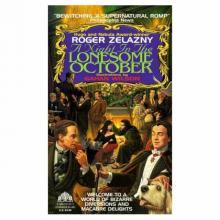 A Night in the Lonesome October
A Night in the Lonesome October Madwand
Madwand Jack Of Shadows
Jack Of Shadows Lord of Light
Lord of Light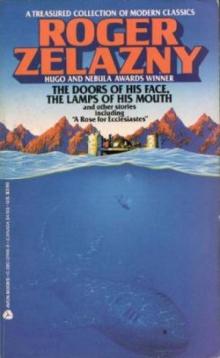 The Doors of His Face, The Lamps of His Mouth and Other Stories
The Doors of His Face, The Lamps of His Mouth and Other Stories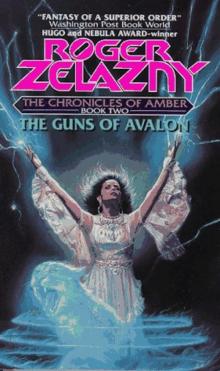 Guns Of Avalon tcoa-2
Guns Of Avalon tcoa-2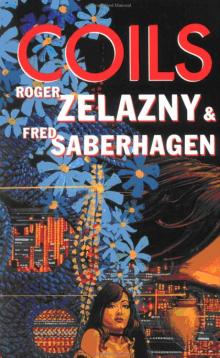 Coils
Coils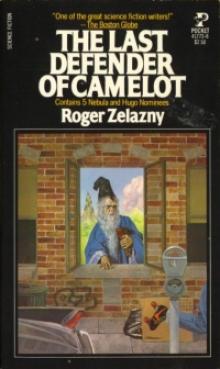 The Last Defender Of Camelot
The Last Defender Of Camelot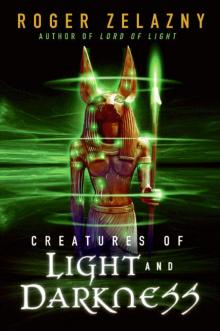 Creatures of Light and Darkness
Creatures of Light and Darkness This Immortal
This Immortal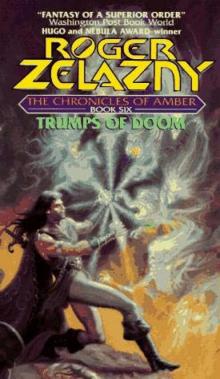 Trumps of doom tcoa-6
Trumps of doom tcoa-6 The Dream Master
The Dream Master The Complete Dilvish, The Damned
The Complete Dilvish, The Damned Nine Princes in Amber
Nine Princes in Amber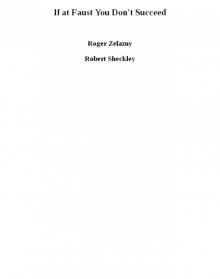 If at Faust You Don't Succeed
If at Faust You Don't Succeed Here there be dragons
Here there be dragons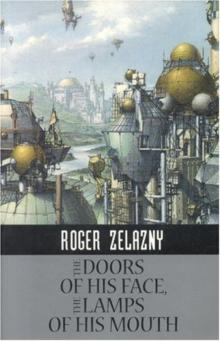 The Doors Of His Face, The Lamps Of His Mouth
The Doors Of His Face, The Lamps Of His Mouth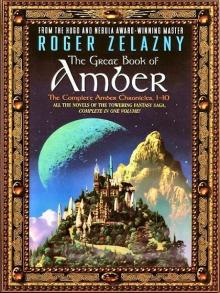 The Great Book of Amber - Chronicles 1-10
The Great Book of Amber - Chronicles 1-10 Madwand (Illustrated)
Madwand (Illustrated) The Chronicles of Amber
The Chronicles of Amber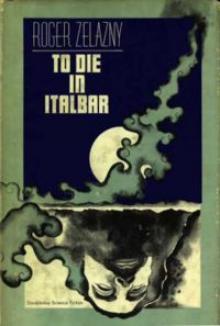 To Die In Italbar
To Die In Italbar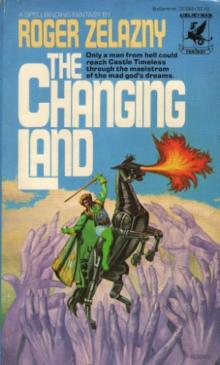 The Changing Land
The Changing Land The Furies
The Furies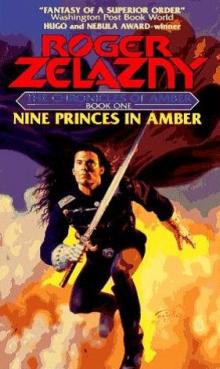 Nine Princes In Amber tcoa-1
Nine Princes In Amber tcoa-1 Last Of The Wild Ones
Last Of The Wild Ones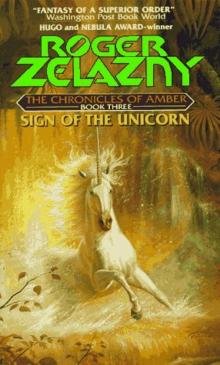 Sign of the Unicorn tcoa-3
Sign of the Unicorn tcoa-3 My Name is Legion
My Name is Legion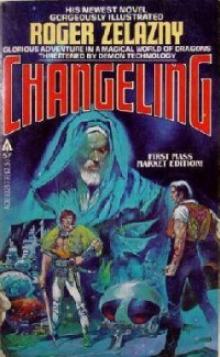 Wizard World 1: Changeling
Wizard World 1: Changeling Changeling
Changeling The Shroudling and the Guisel (amber stories)
The Shroudling and the Guisel (amber stories)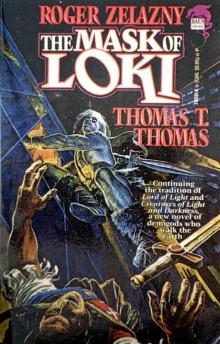 The Mask of Loki
The Mask of Loki A Farce To Be Reckoned With
A Farce To Be Reckoned With Roadmarks
Roadmarks When Pussywillows Last in the Catyard Bloomed (rtf)
When Pussywillows Last in the Catyard Bloomed (rtf) Hall of Mirrors (amber stories)
Hall of Mirrors (amber stories) Permafrost
Permafrost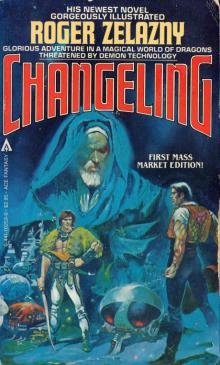 Changeling (Illustrated)
Changeling (Illustrated)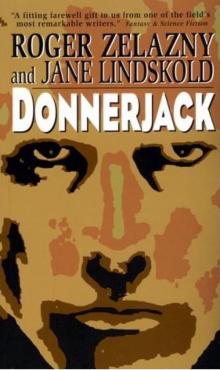 Donnerjack
Donnerjack Shadows & Reflections: A Roger Zelazny Tribute Anthology
Shadows & Reflections: A Roger Zelazny Tribute Anthology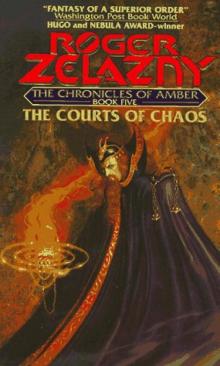 The Courts Of Chaos tcoa-5
The Courts Of Chaos tcoa-5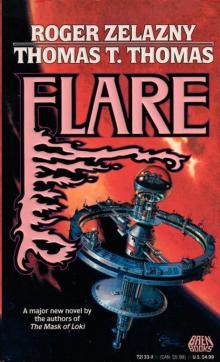 Flare
Flare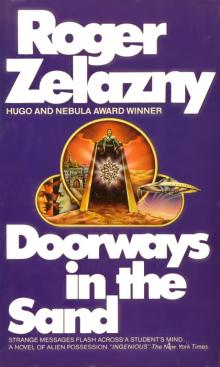 Doorsways in the Sand
Doorsways in the Sand The Great Book of Amber
The Great Book of Amber Home Is the Hangman
Home Is the Hangman For a Breath I Tarry
For a Breath I Tarry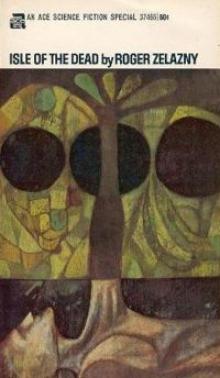 Isle Of The Dead
Isle Of The Dead Salesman Tale (amber stories)
Salesman Tale (amber stories) Dismal Light
Dismal Light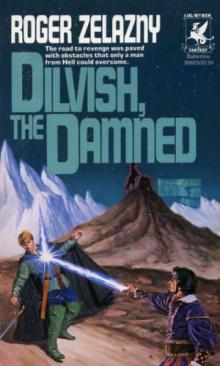 Dilvish, The Damned
Dilvish, The Damned The Black Throne
The Black Throne Wizard World 2: Madwand
Wizard World 2: Madwand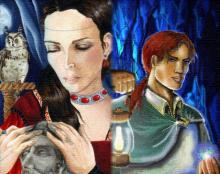 The Salesman's Tale
The Salesman's Tale